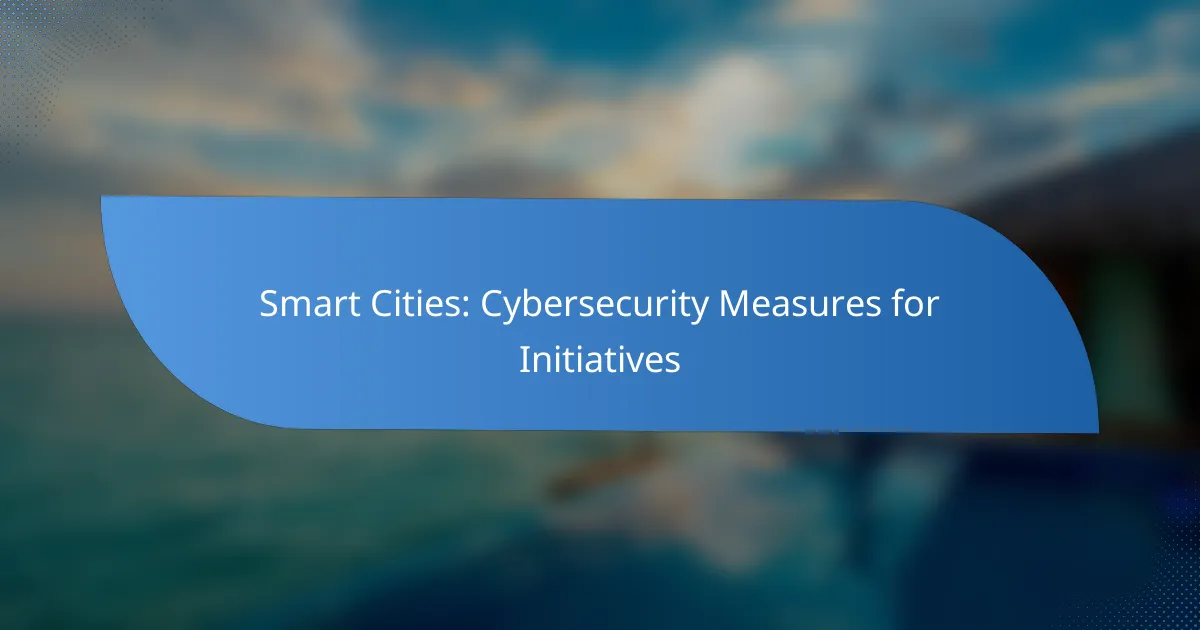As urban areas evolve into smart cities, the integration of advanced technologies brings both opportunities and significant cybersecurity challenges. Effective cybersecurity measures, such as robust network security protocols and strict access controls, are crucial to safeguarding sensitive data and ensuring the integrity of interconnected systems. By collaborating with technology partners and engaging the public in awareness initiatives, smart cities can enhance their resilience against potential threats.
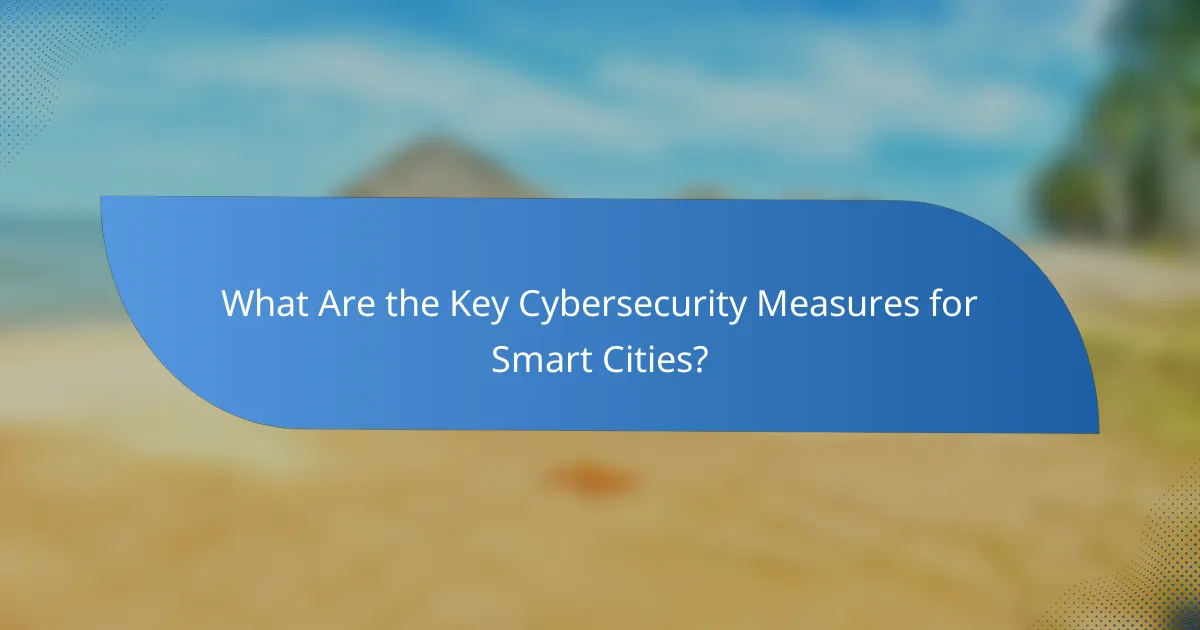
What Are the Key Cybersecurity Measures for Smart Cities?
Key cybersecurity measures for smart cities include robust network security protocols, effective data encryption techniques, comprehensive incident response plans, strict access control systems, and regular security audits. These measures are essential to protect sensitive data and maintain the integrity of interconnected systems within urban environments.
Network Security Protocols
Network security protocols are essential for safeguarding the communication between devices in smart cities. Implementing protocols such as VPNs (Virtual Private Networks) and firewalls can help prevent unauthorized access and data breaches. It’s crucial to regularly update these protocols to counter evolving cyber threats.
Consider using industry standards like IPsec or SSL/TLS for secure data transmission. Additionally, segmenting networks can limit the impact of potential breaches by isolating critical systems from less secure ones.
Data Encryption Techniques
Data encryption techniques protect sensitive information by converting it into unreadable formats that can only be accessed with specific keys. Using strong encryption algorithms, such as AES (Advanced Encryption Standard), is vital for securing data both in transit and at rest.
Smart cities should implement end-to-end encryption for communications between devices and databases. Regularly updating encryption keys and protocols helps mitigate risks associated with data interception.
Incident Response Plans
An effective incident response plan outlines the steps to take when a cybersecurity breach occurs. This plan should include identification, containment, eradication, recovery, and lessons learned phases to ensure a comprehensive approach to managing incidents.
Regularly testing and updating the incident response plan is crucial. Conducting tabletop exercises can help teams prepare for real-world scenarios and improve response times, ultimately minimizing damage during an actual incident.
Access Control Systems
Access control systems manage who can access specific resources within smart city infrastructures. Implementing role-based access control (RBAC) ensures that individuals only have access to the information necessary for their roles, reducing the risk of unauthorized access.
Utilizing multi-factor authentication (MFA) adds an extra layer of security by requiring users to provide multiple forms of identification. Regularly reviewing access permissions can help identify and revoke unnecessary access rights.
Regular Security Audits
Regular security audits are essential for identifying vulnerabilities within smart city systems. These audits should assess both hardware and software components, ensuring compliance with security policies and standards.
Engaging third-party security experts can provide an unbiased evaluation of security measures. Establish a routine schedule for audits, ideally every six months, to stay ahead of potential threats and maintain a strong security posture.
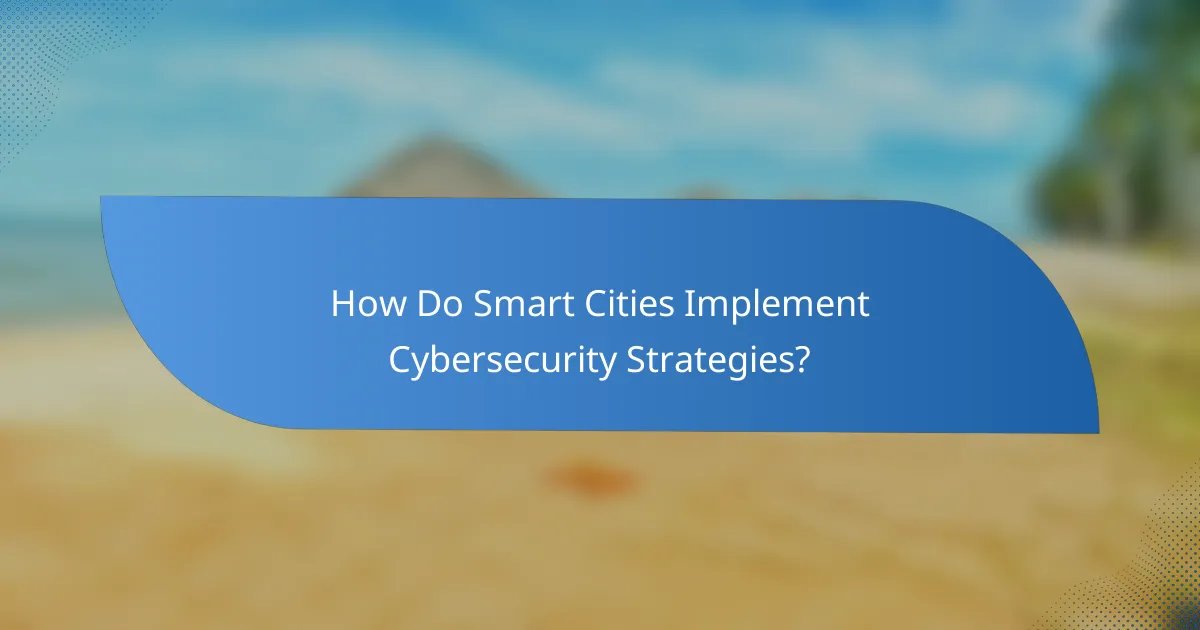
How Do Smart Cities Implement Cybersecurity Strategies?
Smart cities implement cybersecurity strategies by integrating advanced technologies and frameworks to protect their digital infrastructure. This involves collaboration with technology partners, adherence to security standards, and engaging the public in awareness initiatives.
Collaboration with Tech Partners
Smart cities often partner with technology firms to enhance their cybersecurity measures. These collaborations can include sharing resources, expertise, and best practices to create a robust security framework. For example, cities may work with cybersecurity companies to conduct regular risk assessments and vulnerability testing.
Additionally, partnerships can facilitate the development of innovative solutions tailored to the specific needs of urban environments. By leveraging the latest technologies, such as artificial intelligence and machine learning, cities can proactively detect and respond to cyber threats.
Adoption of IoT Security Standards
Implementing Internet of Things (IoT) security standards is crucial for smart cities, as these devices often serve as entry points for cyberattacks. Cities should adopt established frameworks like the NIST Cybersecurity Framework or the IoT Security Foundation guidelines to ensure comprehensive protection. These standards provide a structured approach to identifying risks and implementing necessary controls.
Moreover, cities should prioritize the use of secure communication protocols and regular software updates for IoT devices. This helps mitigate vulnerabilities and enhances the overall security posture of the smart city infrastructure.
Public Awareness Campaigns
Engaging the public through awareness campaigns is essential for fostering a culture of cybersecurity in smart cities. These initiatives can educate citizens about potential threats and encourage safe online behaviors. For instance, cities might organize workshops or distribute informational materials on recognizing phishing attempts and securing personal devices.
Furthermore, public campaigns can promote the importance of reporting suspicious activities, which can help authorities respond more effectively to cyber incidents. By involving the community, smart cities can create a more resilient cybersecurity environment.
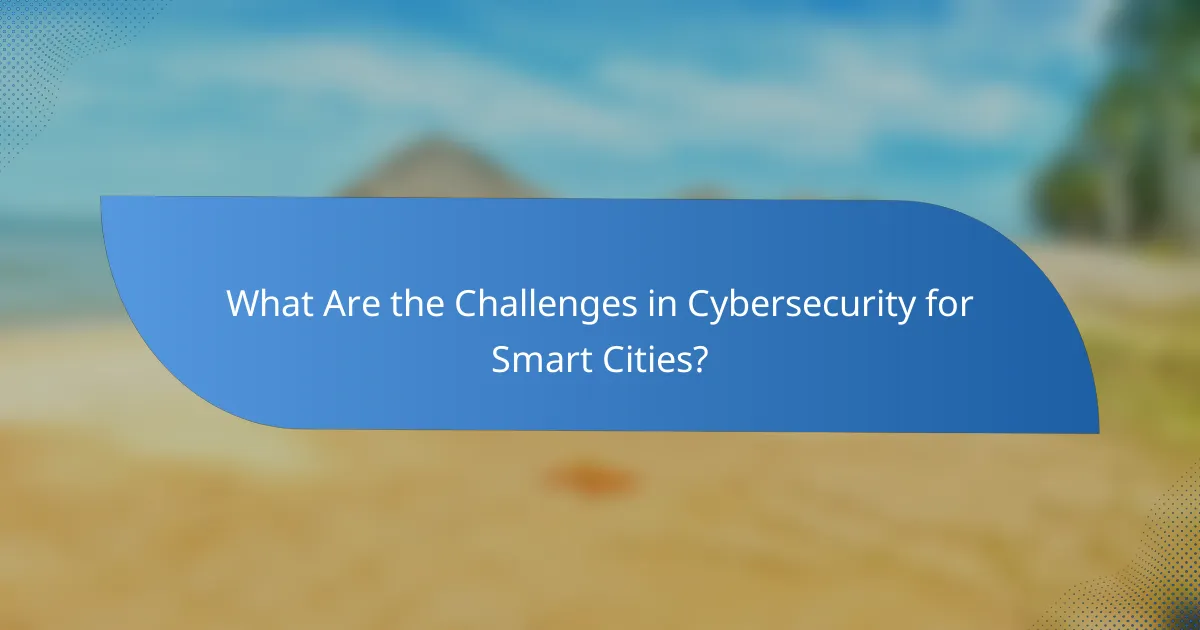
What Are the Challenges in Cybersecurity for Smart Cities?
Smart cities face significant cybersecurity challenges due to their reliance on interconnected systems and vast amounts of data. These challenges can lead to vulnerabilities that may compromise public safety, privacy, and infrastructure integrity.
Legacy System Vulnerabilities
Many smart cities still operate on outdated legacy systems that were not designed with modern cybersecurity threats in mind. These systems often lack the necessary updates and patches, making them easy targets for cyberattacks.
Addressing legacy vulnerabilities requires a strategic approach, including regular assessments and upgrades. Cities should prioritize replacing or retrofitting these systems to enhance security and integrate them with newer technologies.
Resource Allocation Issues
Limited budgets and resources can hinder the implementation of robust cybersecurity measures in smart cities. Allocating funds for cybersecurity often competes with other pressing urban needs, leading to inadequate protection.
To effectively manage resources, cities should conduct risk assessments to identify critical areas needing investment. Collaborating with public-private partnerships can also help leverage additional funding and expertise.
Data Privacy Concerns
Smart cities collect vast amounts of personal data, raising significant privacy concerns. Without stringent data protection measures, citizens’ information can be exposed or misused, leading to a loss of trust in smart city initiatives.
Implementing strong data governance policies is essential. Cities should ensure compliance with regulations like the General Data Protection Regulation (GDPR) and establish clear protocols for data access, storage, and sharing to protect citizen privacy.

What Role Do Government Policies Play?
Government policies are crucial in shaping cybersecurity measures for smart city initiatives. They establish the regulatory environment, set standards for data protection, and allocate funding to enhance security infrastructure.
Regulatory Frameworks
Regulatory frameworks provide the guidelines that govern cybersecurity practices in smart cities. These frameworks often include compliance requirements for data protection, incident reporting, and risk management, ensuring that municipalities adhere to best practices.
For instance, the General Data Protection Regulation (GDPR) in Europe mandates strict data handling protocols, influencing how cities manage citizen data. Local governments must regularly review and update their policies to align with evolving regulations and emerging threats.
Funding for Cybersecurity Initiatives
Funding is essential for implementing effective cybersecurity measures in smart cities. Governments often allocate budgetary resources to support cybersecurity initiatives, which can include grants, public-private partnerships, and dedicated cybersecurity programs.
For example, cities may receive federal or state funding to enhance their cybersecurity infrastructure, which can cover costs for technology upgrades, training, and incident response capabilities. It is important for city planners to actively seek funding opportunities and prioritize cybersecurity in their budgets to mitigate risks effectively.
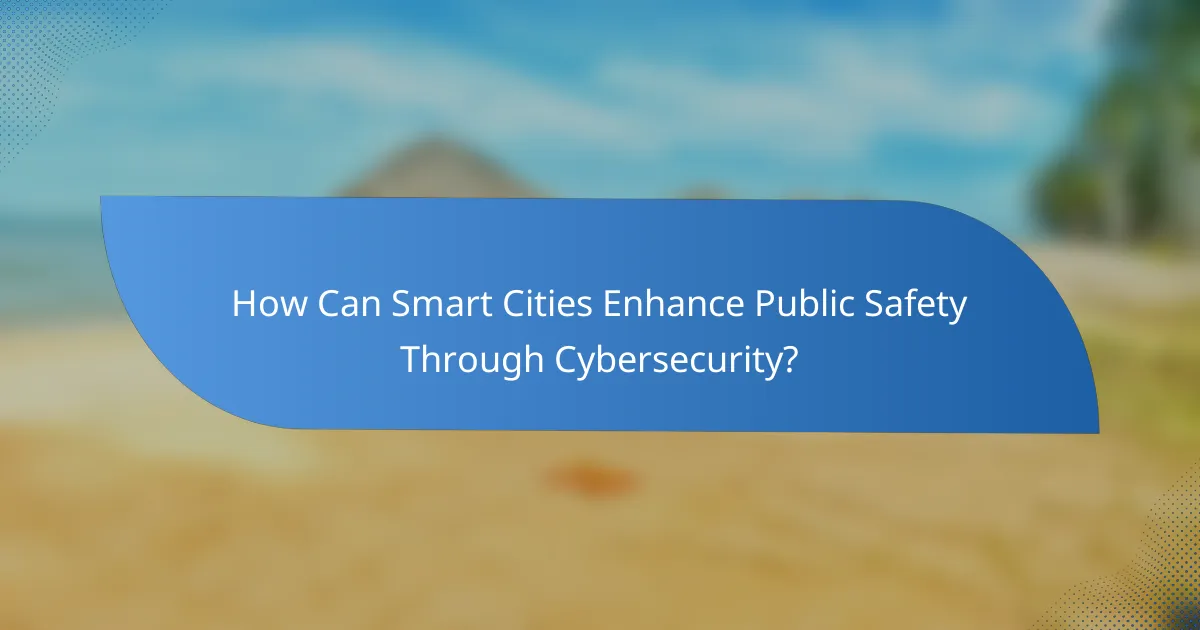
How Can Smart Cities Enhance Public Safety Through Cybersecurity?
Smart cities can significantly enhance public safety by implementing robust cybersecurity measures that protect critical infrastructure and data. By prioritizing cybersecurity, these urban environments can prevent cyber threats that may disrupt services or compromise citizen safety.
Real-Time Threat Monitoring
Real-time threat monitoring involves continuously observing network activities to identify and respond to potential cyber threats immediately. Smart cities can deploy advanced security information and event management (SIEM) systems that analyze data from various sources, such as traffic cameras and IoT devices, to detect anomalies.
For effective monitoring, cities should establish a dedicated cybersecurity operations center (CSOC) that operates 24/7. This center can utilize machine learning algorithms to predict and mitigate risks, ensuring a proactive approach to cybersecurity.
Community Engagement Programs
Community engagement programs are essential for raising awareness about cybersecurity threats and promoting safe practices among residents. Smart cities can organize workshops and informational sessions that educate citizens on recognizing phishing attempts, securing personal devices, and reporting suspicious activities.
Additionally, cities can create online platforms or mobile apps that allow residents to report cybersecurity incidents easily. By fostering a culture of vigilance and collaboration, communities can enhance their overall security posture and contribute to a safer urban environment.
